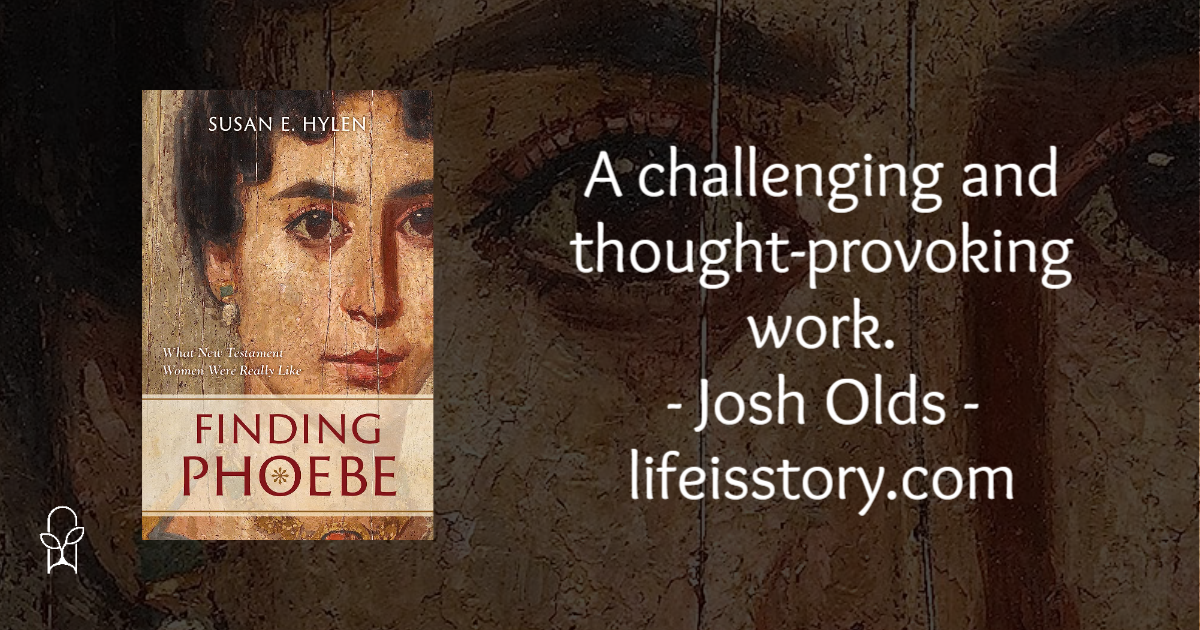
Published by Eerdmans on January 17, 2023
Genres: Academic, Non-Fiction, Theology
Buy on Amazon
Goodreads

Forget what you think you know about women in the early church.
In this learned yet accessible book, Susan E. Hylen introduces first-century primary sources to illuminate readers’ understanding of New Testament women. Perfect for clergy, spiritual reading groups, and all curious minds, Finding Phoebe combines incisive scholarship and instructional sensibility to encourage readers to develop their own informed interpretations of Scripture.
Contrary to popular conceptions of “biblical womanhood” as passive and silent, women often served as leaders and prophets in their communities. Women owned one-third of all property during the period, granting them access to civic power through patronage. Many women worked outside the home and were educated according to the needs of their professions. Through careful examination of “modesty” and “silence” in the Greco-Roman world, Hylen reveals the centrality of these virtues to both men and women practicing self-control in service of communal good.
Hylen’s work will challenge readers to free their minds of modern preconceptions and consider New Testament women on their own terms. This practical book includes historical context, scriptural evidence, and questions for discussion.
The back cover of Finding Phoebe: What New Testament Women Were Really Like reads “Forget What You Think You Know About Women in the Early Church.” That’s a pretty bold claim, especially considering that different Christian denominations have wildly different interpretations of the role of women in the church. However, those divergent interpretations often rest on the same foundation—“The basic idea is that women weren’t able to do much” (3). Hylen, however, a professor of New Testament whose academic expertise is women in the New Testament world, says that may not have been the case and draws out to primary distinctions; First, women owned property and exercised authority over their affairs. Second, women served as patrons, using their wealth and social influence. Third, women participated in community life, including in leadership roles. While women were deemed inferior to men, women in places of authority were not seen as contradictory and was part of the tension of the social fabric.
Hylen divides the exploration of this thesis into four parts. In part one, she examines wealth and property. Chapters are devoting to property ownership, management, marriage, and occupations. Finding Phoebe builds the case that women had more autonomy than we might have thought. For example, using ancient documents, Hylen makes the case that Jewish women could initiate divorce from her husband. The second part deals with social influence and status with chapters on patronage, social influence and education. The third part details the ideal virtues of women, while the fourth narrows in on “speech and silence,” discussing Paul’s infamous quote that women “should be silent in the churches.”
One of the things that Finding Phoebe does masterfully is take some of the Scriptures that appear to limit women and compare them against similar Scriptures that offer similar limitation to a broader audience. She also compares those verses to “exceptions to the rule”—for example where we do see women speaking, worshipping, and leading in the church. All of this helps us to better understand the cultural context into which these statements were made. It serves as a corrective to the view that women of that era were helpless chattel and highlights how women have always been battling and circumventing patriarchal attitudes.
Finding Phoebe is also unique is that it is meant to be read as a study, with each chapter concluding with a list of discussion questions and prompts. This really helps make the book practical, teaching readers how to exegete and think about Scripture and develop applications in the modern day. I do wish that Hylen had spent more time developing her arguments, rather than just presenting them. By her own admission, her position on the role/authority of women in the Mediterranean world is a minority position—at least in popular circles. For example, Hylen suggests that Jewish women could divorce their husbands and cites a very academic reference—the Aegyptische Urkunden aus den Koniglichen 4.1103—as her evidence. But Orthodox Judaism holds that only men can initiate divorces and has disputed as spurious or not indicative of what should be any claims otherwise. Hylen doesn’t offer much space to discussion of why the dominant view became the dominant view, just that it is wrong.
Overall, Finding Phoebe is a challenging and thought-provoking work. I’m interested to see the opinions of other New Testament scholars to see if they have any agreements or disagreements in the matter. As a relative layperson, I can tell you that Hylen offers her arguments accessibly and straightforwardly, but the relative obscurity and paucity of her cited references and lack of engagement with other scholarly material—while befitting the book’s tone—keeps her argument from being as strong as it otherwise could have been.
